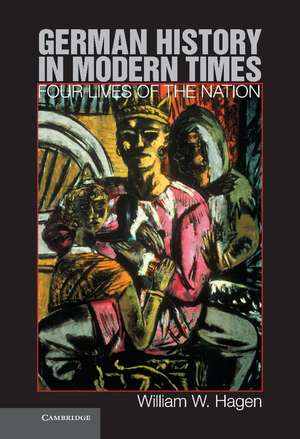German History in Modern Times: Four Lives of the Nation
Autor William W. Hagenen Limba Engleză Hardback – 12 feb 2012
| Toate formatele și edițiile | Preț | Express |
|---|---|---|
| Paperback (1) | 298.43 lei 6-8 săpt. | |
| Cambridge University Press – 12 feb 2012 | 298.43 lei 6-8 săpt. | |
| Hardback (1) | 750.88 lei 6-8 săpt. | |
| Cambridge University Press – 12 feb 2012 | 750.88 lei 6-8 săpt. |
Preț: 750.88 lei
Preț vechi: 873.12 lei
-14% Nou
Puncte Express: 1126
Preț estimativ în valută:
143.68€ • 150.42$ • 118.89£
143.68€ • 150.42$ • 118.89£
Carte tipărită la comandă
Livrare economică 07-21 aprilie
Preluare comenzi: 021 569.72.76
Specificații
ISBN-13: 9780521191906
ISBN-10: 0521191904
Pagini: 482
Ilustrații: 158 b/w illus. 17 maps 2 tables
Dimensiuni: 156 x 234 x 30 mm
Greutate: 0.79 kg
Editura: Cambridge University Press
Colecția Cambridge University Press
Locul publicării:New York, United States
ISBN-10: 0521191904
Pagini: 482
Ilustrații: 158 b/w illus. 17 maps 2 tables
Dimensiuni: 156 x 234 x 30 mm
Greutate: 0.79 kg
Editura: Cambridge University Press
Colecția Cambridge University Press
Locul publicării:New York, United States
Cuprins
1. Master narratives and rival interpretations of modern German history; Part I. German Central Europe before Modern Nationalism: 2. The pyramid of power in pre-modern Germany; 3. Baroque and Enlightenment Germany, 1648–1789; 4. Power states (Machtstaaten): the rise of the Prussian and Austrian military-bureaucratic monarchies; 5. Aufklärung: the German Enlightenment and other spirits of the age; Part II. German Identities between Liberalism, Nationalism, and Socialism, 1789–1914: 6. Revolution on the march: French challenge, German response, 1789–1815; 7. 'Land of poets and thinkers': the transition from Enlightenment universalism to German national culture; 8. Freedom and voice, 'blood and iron': the struggle over liberalism and nationalism, 1815–1914; 9. Power to the people: German social democracy in the age of industrialization; 10. Women, family, feminism, 1789–1914; 11. Habsburg Austria: a multinational path in German history; 12. Jews, Germans, German Jews, 1789–1914; Part III. Nation in Crisis: Defeat, Turmoil, Aggression, 1914–15: 13. The Prussian-German monarchy's sudden death: World War I and postwar revolution, 1914–20; 14. Democracy's bitter fruits: society and politics, 1918–33; 15. The rise of Hitlerism: middle-class discontent and populist utopia; 16. The 'people's community' at Hitler's command: national and socialist Germany, 1933–45; 17. Lebensraum: the war for empire in Eastern Europe; 18. Banned from nation and earth: German Jews after 1914, Nazi 'Jewish policy', and the Holocaust; Part IV. The Cold War Germanies and their Post-1989 Fusion: A Nation Reforged from Its Remnants?: 19. Return from the abyss: defeated Germany and the West German Federal Republic, 1949–89; 20. 'Real existing socialism': Soviet-occupied Germany and the German Democratic Republic, 1949–90; 21. Present-day Germany: the post-unification scene in West and East.
Recenzii
“Bill Hagen has written a remarkable book that reconceptualizes the course of German history in several critical dimensions. Not only does Hagen take on and challenge several of the most conventional historiographical interpretations of the longue durée of German history (the Sonderweg thesis, etc.), but he shows in a very compelling way that one cannot understand German history in the twentieth century without a deep and profound knowledge of the history of the several competing German nations before 1866 and even before 1806. The result is an elegantly written book of great ambition and fascinating detail, particularly strong in social and political history and filled with surprising interpretive suggestions. The many illustrations, deeply integrated into the multiple, cascading narratives of the book, are also quite noteworthy.” —John W. Boyer, University of Chicago
“Over a distinguished career William Hagen’s histories have ranged masterfully across the fullest expanse of the German past, beginning in the long nineteenth century and continuing through the largest version of an early modern longue durée, before returning to the first half of the twentieth century. His themes have included the nationality conflicts of the Prussian east, early modern state formation and the character of absolutism, the relations of Junkers and villagers across four centuries, the transition from feudalism to capitalism, and the character of modern anti-semitism. He now brings this extraordinary depth of knowledge to an ambitiously conceived general history, whose varying notations of ‘Germany’ between the premodern Holy Roman Empire and the successive states of modern times (his ‘four lives of the nation’) cast a familiar landscape in exciting new light. In its dethroning of His Majesty the nation-state, attentiveness to the many different Germanies, and attunement to the ethico-political challenge of writing German history after Nazism, this is truly a history for our times.” —Geoff Eley, University of Michigan
“This book is an extraordinary achievement by a leading authority in the field of German history. Lucid accounts of social and political continuity and change are set within a highly distinctive narrative architecture structured around the violent disruptions of modern German history. Rich in fresh and arresting insights and enlivened by vivid and beautifully illustrated individual portraits, German History in Modern Times is not just a masterpiece, but a deeply enjoyable read.” —Christopher Clark, University of Cambridge
“William Hagen’s strikingly original book offers a rich picture of the history of German-speaking Central Europe since the Reformation. Hagen treats neither Nazism nor market capitalism as natural or inevitable results of the many-sided history of this diverse region, but emphasizes contingencies—and the reversibility of developments like liberalism, authoritarianism, communist dictatorship, and European integration. Hagen’s concise text is accompanied by a thought-provoking visual history which offers a set of unusual and well-chosen images, and a fine bibliography. Both students and professional scholars will find this a fresh, clear and fascinating introduction to the history of not one, but many Germanies over the last 500 years.” —Suzanne Marchand, Louisiana State University
“A fresh, judicious, and readable survey which, like Hagen’s previous scholarship, spans more than four centuries. His imaginative organization of German history into four ‘lives’ conveys a sense of its open-endedness and contingency. Though not at all denying the tragic and darker sides of German history, Hagen ends by emphasizing the important ways in which Germans have charted new paths since 1945.” —James Van Horn Melton, Emory University; President-elect, Organization of Central European Historians
“German History in Modern Times distills a lifetime of scholarly engagement with the German past. William Hagen's new book has something for everyone, from readers who are looking for a reliable introduction to Germany's turbulent history to experts who will find new and provocative insights. The book's value is enhanced by a fine collection of maps and a large number of carefully-chosen and brilliantly-described illustrations. This is a wonderful book.” —James J. Sheehan, Stanford University
“Clear, precise, sophisticated, and profusely illustrated, Hagen’s German History in Modern Times is now the best one-volume textbook in the field. It combines wide sweep with remarkable depth, tying together Germany’s recent and more distant pasts into a coherent understanding. For serious students of Germany’s troubled history, this is an ideal starting place.” —Helmut Walser Smith, Vanderbilt University
“William Hagen brings a lifetime of learning to bear on that always fraught topic, German history. The result is an engaging and erudite exploration that bristles with insights and information. Hagen covers the broad expanse of German history, not just the post-1871 territorial state, and effectively combines political, social, economic, and cultural history. Lavishly illustrated with expert commentary, this is a book that both novice and expert will learn from and cherish.” —Eric D. Weitz, University of Minnesota, author of Weimar Germany: Promise and Tragedy
"Highly recommended." -Choice
"...balanced and, above all, sensible." -Thomas A. Kohut, The Weekly Standard
"William Hagen’s work in both early modern and modern German history is well known and highly regarded, and this new survey of German history reflects Hagen’s broad previous experience." -Frank B. (Ben) Tipton, German Studies Review
“Challenging the usual ‘master narratives,’ William W. Hagen has succeeded in writing a masterful work.” -Dieter Langewiesche, H-NET
“elegantly provide[s] visual and cartopgraphic evidence of different Germanies.” -Shelley Baranowski, Central European History
"This review is notable both for its positive quality and for reflecting the views of a younger specialist in the field of German Cultural Studies." -Daniel Villanueva, Rocky Mountain Review
“Over a distinguished career William Hagen’s histories have ranged masterfully across the fullest expanse of the German past, beginning in the long nineteenth century and continuing through the largest version of an early modern longue durée, before returning to the first half of the twentieth century. His themes have included the nationality conflicts of the Prussian east, early modern state formation and the character of absolutism, the relations of Junkers and villagers across four centuries, the transition from feudalism to capitalism, and the character of modern anti-semitism. He now brings this extraordinary depth of knowledge to an ambitiously conceived general history, whose varying notations of ‘Germany’ between the premodern Holy Roman Empire and the successive states of modern times (his ‘four lives of the nation’) cast a familiar landscape in exciting new light. In its dethroning of His Majesty the nation-state, attentiveness to the many different Germanies, and attunement to the ethico-political challenge of writing German history after Nazism, this is truly a history for our times.” —Geoff Eley, University of Michigan
“This book is an extraordinary achievement by a leading authority in the field of German history. Lucid accounts of social and political continuity and change are set within a highly distinctive narrative architecture structured around the violent disruptions of modern German history. Rich in fresh and arresting insights and enlivened by vivid and beautifully illustrated individual portraits, German History in Modern Times is not just a masterpiece, but a deeply enjoyable read.” —Christopher Clark, University of Cambridge
“William Hagen’s strikingly original book offers a rich picture of the history of German-speaking Central Europe since the Reformation. Hagen treats neither Nazism nor market capitalism as natural or inevitable results of the many-sided history of this diverse region, but emphasizes contingencies—and the reversibility of developments like liberalism, authoritarianism, communist dictatorship, and European integration. Hagen’s concise text is accompanied by a thought-provoking visual history which offers a set of unusual and well-chosen images, and a fine bibliography. Both students and professional scholars will find this a fresh, clear and fascinating introduction to the history of not one, but many Germanies over the last 500 years.” —Suzanne Marchand, Louisiana State University
“A fresh, judicious, and readable survey which, like Hagen’s previous scholarship, spans more than four centuries. His imaginative organization of German history into four ‘lives’ conveys a sense of its open-endedness and contingency. Though not at all denying the tragic and darker sides of German history, Hagen ends by emphasizing the important ways in which Germans have charted new paths since 1945.” —James Van Horn Melton, Emory University; President-elect, Organization of Central European Historians
“German History in Modern Times distills a lifetime of scholarly engagement with the German past. William Hagen's new book has something for everyone, from readers who are looking for a reliable introduction to Germany's turbulent history to experts who will find new and provocative insights. The book's value is enhanced by a fine collection of maps and a large number of carefully-chosen and brilliantly-described illustrations. This is a wonderful book.” —James J. Sheehan, Stanford University
“Clear, precise, sophisticated, and profusely illustrated, Hagen’s German History in Modern Times is now the best one-volume textbook in the field. It combines wide sweep with remarkable depth, tying together Germany’s recent and more distant pasts into a coherent understanding. For serious students of Germany’s troubled history, this is an ideal starting place.” —Helmut Walser Smith, Vanderbilt University
“William Hagen brings a lifetime of learning to bear on that always fraught topic, German history. The result is an engaging and erudite exploration that bristles with insights and information. Hagen covers the broad expanse of German history, not just the post-1871 territorial state, and effectively combines political, social, economic, and cultural history. Lavishly illustrated with expert commentary, this is a book that both novice and expert will learn from and cherish.” —Eric D. Weitz, University of Minnesota, author of Weimar Germany: Promise and Tragedy
"Highly recommended." -Choice
"...balanced and, above all, sensible." -Thomas A. Kohut, The Weekly Standard
"William Hagen’s work in both early modern and modern German history is well known and highly regarded, and this new survey of German history reflects Hagen’s broad previous experience." -Frank B. (Ben) Tipton, German Studies Review
“Challenging the usual ‘master narratives,’ William W. Hagen has succeeded in writing a masterful work.” -Dieter Langewiesche, H-NET
“elegantly provide[s] visual and cartopgraphic evidence of different Germanies.” -Shelley Baranowski, Central European History
"This review is notable both for its positive quality and for reflecting the views of a younger specialist in the field of German Cultural Studies." -Daniel Villanueva, Rocky Mountain Review
Notă biografică
Descriere
This history of German-speaking central Europe presents the different eras of German history as successive worlds of German life, thought and mentality.













